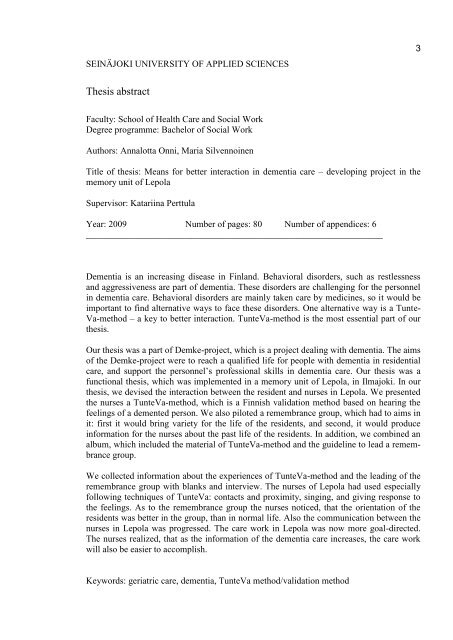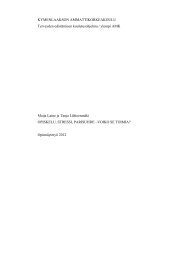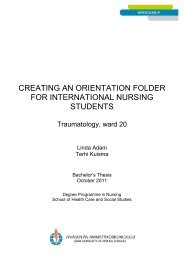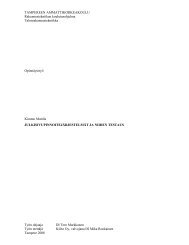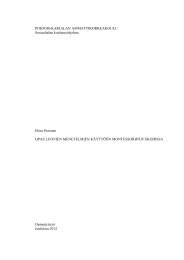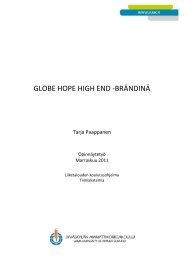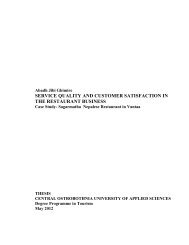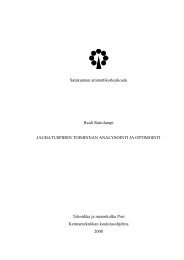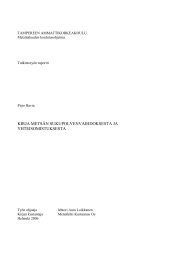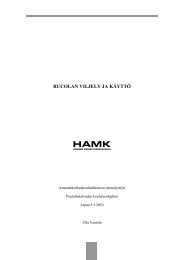Annalotta Onni Maria Silvennoinen Avaimia parempaan ...
Annalotta Onni Maria Silvennoinen Avaimia parempaan ...
Annalotta Onni Maria Silvennoinen Avaimia parempaan ...
Create successful ePaper yourself
Turn your PDF publications into a flip-book with our unique Google optimized e-Paper software.
SEINÄJOKI UNIVERSITY OF APPLIED SCIENCES<br />
Thesis abstract<br />
Faculty: School of Health Care and Social Work<br />
Degree programme: Bachelor of Social Work<br />
Authors: <strong>Annalotta</strong> <strong>Onni</strong>, <strong>Maria</strong> <strong>Silvennoinen</strong><br />
Title of thesis: Means for better interaction in dementia care – developing project in the<br />
memory unit of Lepola<br />
Supervisor: Katariina Perttula<br />
Year: 2009 Number of pages: 80 Number of appendices: 6<br />
_________________________________________________________________<br />
Dementia is an increasing disease in Finland. Behavioral disorders, such as restlessness<br />
and aggressiveness are part of dementia. These disorders are challenging for the personnel<br />
in dementia care. Behavioral disorders are mainly taken care by medicines, so it would be<br />
important to find alternative ways to face these disorders. One alternative way is a Tunte-<br />
Va-method – a key to better interaction. TunteVa-method is the most essential part of our<br />
thesis.<br />
Our thesis was a part of Demke-project, which is a project dealing with dementia. The aims<br />
of the Demke-project were to reach a qualified life for people with dementia in residential<br />
care, and support the personnel’s professional skills in dementia care. Our thesis was a<br />
functional thesis, which was implemented in a memory unit of Lepola, in Ilmajoki. In our<br />
thesis, we devised the interaction between the resident and nurses in Lepola. We presented<br />
the nurses a TunteVa-method, which is a Finnish validation method based on hearing the<br />
feelings of a demented person. We also piloted a remembrance group, which had to aims in<br />
it: first it would bring variety for the life of the residents, and second, it would produce<br />
information for the nurses about the past life of the residents. In addition, we combined an<br />
album, which included the material of TunteVa-method and the guideline to lead a remembrance<br />
group.<br />
We collected information about the experiences of TunteVa-method and the leading of the<br />
remembrance group with blanks and interview. The nurses of Lepola had used especially<br />
following techniques of TunteVa: contacts and proximity, singing, and giving response to<br />
the feelings. As to the remembrance group the nurses noticed, that the orientation of the<br />
residents was better in the group, than in normal life. Also the communication between the<br />
nurses in Lepola was progressed. The care work in Lepola was now more goal-directed.<br />
The nurses realized, that as the information of the dementia care increases, the care work<br />
will also be easier to accomplish.<br />
Keywords: geriatric care, dementia, TunteVa method/validation method<br />
3


